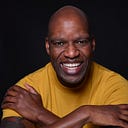Member-only story
When White People Say They ‘Don’t See Color’
We know you do — and you know it, too
 When I was a kid, my White classmates always compared me to a cookie. I remember one specifically said, “You’re like an Oreo: Black on the outside but White on the inside. You’re cool.” In their young minds, this was a compliment. They didn’t realize how offensive that statement was — and back then, neither did I.
When I was a kid, my White classmates always compared me to a cookie. I remember one specifically said, “You’re like an Oreo: Black on the outside but White on the inside. You’re cool.” In their young minds, this was a compliment. They didn’t realize how offensive that statement was — and back then, neither did I.
Now that I have decades of life behind me, I understand what they were actually saying: The best Black person is one who can pass for White in the dark.
Growing up, my mother often reminded me that I could be anything I wanted, but I’d have to work a little harder because I’m Black. She warned me early on that I’d have a tougher road ahead than my White classmates because of the color of my skin.
“When you get to high school, those White kids will try to take advantage of you,” my eighth grade English teacher told me after she caught one of my White classmates copying my social studies homework. It was the first time Mrs. Powell, who was Black, had ever vocally acknowledged our shared skin color, but I knew we’d always had an unspoken understanding: We were not like everyone else in the classroom.
Mom, Mrs. Powell, and so many others raised me to know the difference between right and wrong, and Black and White. That knowledge shaped me and made me the man I am proud to be today — the Black man. If you look at me and don’t see the color of my skin, you don’t see me at all.
But did my classmates understand that concept back then? Did they think I had value only because despite my Black skin, they considered me a White person, just like them? Even though they believed they accepted me, I knew that the acceptance came with an unspoken condition: If I ever truly expressed my Blackness, there’d be no more friendship.
At least they acknowledged my Black skin. These days, a new generation of “woke” White people use different tactics when feebly trying to express acceptance of Black people. It’s common to hear well-meaning White people say, “I don’t see color or race,” as if somehow they’ve reached the highest point of racial enlightenment. In their mindset, race not only doesn’t matter, but it also ceases to exist altogether.

